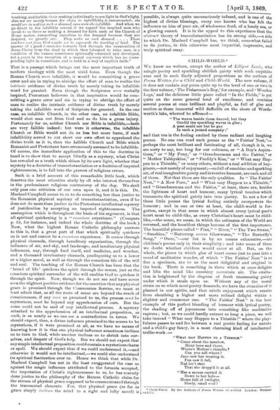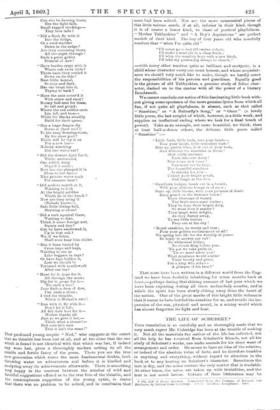CHILD-WORLD.*
WE know no writers, except the author of Lilliput Levee, who mingle poetry and sparkling childish gaiety with such exquisite
ease and in such finely adjusted proportions as the authors of Poems Written for a Child and Child-World. The new volume, if it does not contain any poem quite up to the level of one or two in the first volume, 'The Fisherman's Boy,' for example, and Wooden Legs,' and the delicious little piece called "In the Fields," is yet quite on the same general level of excellence, and contains several poems at once brilliant and playful, as full of glee and motion as those immortal wild daffodils on the shore of Wordsworth's lake, whereof he affirmed
" The waves beside them danced, but they
Outdid the sparkling waves in glee ; A poet could not but be gay
In such a jocund company ;"
and that too is the feeling excited by these radiant and laughing poems. No one can read such poems as the "Fairies' Nest,"-perhaps the most brilliant and fascinating of all, though it is, we are sorry to say, too long for our columns, or "A Boy's Aspirations," or "My Pony," or " Grandmarnma and the Fairies," or "Mother Tabbyskins," or " Freddy's Kiss," or "What may Happen to a Thimble," or many others, without a real addition of happiness,--not merely of enjoyment ;—so full of sunshine and sparkling air, of real imaginative gaiety and inventive humour, are each and all of them. Not that these are the only qualities. In "The Fairies' Nest," "A New Fern," and " What may Happen to a Thimble," and " Grandmamma and the Fairies," at least, there are, besides the lightness of heart and humour, many lyrical touches which transmute the spiritual gaiety into true poetry. In not a few of these little poems the lyrical feeling entirely overpowers the humour ; and in one or two at least, the child-world is forgotten, except in that sense in which almost every lyrical poet's heart must be child-like, as every Christian's heart must be child like,—the sense, we mean, in which the estimates of the World are reversed, and the humblest things become of the first importance.
The beautiful pieces called " Flax," " River," "The Two Swans," "Sunshine," "Buttercup versus Glowworm," "The Butterfly's Song," "Once,"—our list is by no means exhaustive,—are children's poems only in their simplicity ; and into some of them we doubt whether children would enter at all. But, on the whole, the pieces in which glee of heart seems just to pass into a mood of meditative wonder, of which "The Fairies' Nest" is so fine a specimen, are to us the most delightful and original in the book. There is something in them which at once delights and lifts the mind like sunshiny mountain air. The exalta tion is heightened by the disguise of fresh unassuming gaiety under which it steals upon us. Without any of the moral strain on us which most poetry demands, we have the stimulus of it planted in our spirits, and that subtle enjoyment which results from sheathing a higher and more refined delight within a slighter and commoner one. "The Fairies' Nest" is the best example of this perfect blending of humour with lyrical poetry, the shading off ef joyousness into something like meditative rapture ; but, as we could hardly extract so long a piece, we will take instead "What may Happen to a Thimble I" where the playfulness passes to and fro between a real poetic feeling for nature and a child's gay fancy, in a most charming kind of intellectual trellis-work :—
"WHAT MAY HAPPEN TO A THIMBLE."
"Come about the meadow, Hunt here and there,
Where's Mother's thimble ? Can you tell where ?
Jane saw her wearing it, Fan saw it fall,
Ned isn't intro
That she dropp'd it at all.
"Has a mouse carried it Down to her hole— Home fall of twilight, Shady, small soul ?
• Chttet-IVarid. By the Authors of Poems Written for a Child. Loudon: Studien and Co.
Can she be darning there, Ere the light fails, Small ragged stockings— Tiny torn tails ?
"Did a finch fly with it Into the hedge, Or a reed-warbler Down in the sedge? Are they carousing there. All the night through? Such a great goblet Brimful of dew !
"Have beetles crept with it Where oak roots bide?
There have they settled it Down on its side ? Neat little kennel, So cosy and dark, Has one crept into it, Trying to bark? • "Have the ants cover'd it With straw and sand? Roomy bell-tent for them, So tall and grand; Where the red soldier-ants
Lie, loll, and lean— While the blacks steadily
Build for their queen.
"Has a huge dragon-fly Borne it (how cool!) To his snug dressing-room, By the clear pool? There will he try it on For a new hat— Nobody watching But one water-rat?
"Did the flowers fight for it, undescried, One selfish daisy Slipp'd it aside ; Now has she plunged it in
Close to her feet— Nice private water-tank
For summer heat ?
"Did spiders snatch at it, Wanting to look At the bright pebbles Which lie in the brook ?
Now are they using it (Nobody knows!), Safe little diving-bell,
Shutting so close?
'Did a rash squirrel there, Wanting to dine, Think it some foreign nut, Dainty and fine?
Can he have swallowed it, Up in that oak ?
We, if we listen, Shall soon hear him choke.
"Has it been buried by Cross imps and hags, Wanting to see us Like beggars in rags? Or have fays bidden it, Lest we should be Tortured with needlework After our tea?
"Hunt for it, hope for it, All through the moss ; Dip for it, grope for it'Tis such a loss!
Jane finds a drop of dew, Fan finds a stone ; I find the thimble, Which is Mother's own !
"Run with it, fly with it— Don't let it fall; All did their best for it— Mother thanks all.
Just as we give it her,— Think what a shame !— Ned says he's sure
That it isn't the some
That profound young sceptic "Ned," who suggests at the outset that no thimble has been lost at all, and at the close that the one Which is found is not identical with that which was lost, if indeed any were lost, gives a thoroughly modern setting to all the nimble and fertile fancy of the poem. There you see the true new generation which raises the most fundamental doubts, both throwing water on adventurous zeal before it is kindled and analysing away its achievements afterwards. There is something very happy in the contrast between the Danaher of wild and fanciful suggestions offered as to the true fate of the thimble, and the contemptuous suggestion of the young cynic, in limine that there was no problem to be solved, and in conclusion that
none had been solved. Nor are the more nonsensical pieces of this little volume much, if at all, inferior in their kind, though it is of course a lower kind, to those of poetical playfulness. "Mother Tabbyskins " and "A Boy's Aspirations" are perfect models of their kind. The boy of four years old who manfully resolves that "when I'm quite old
"I'll never go to bed till twelve o'clock, I'll make a mud pie in a clean frock ; rn whip the naughty boys with a new birch, I'll take my guinea-pig always to church,"
—with many other resolves quite as brilliant and eudgetic, is a child whose character every one must honour, and whose acquaintance we should very much like to make, though we hardly covet the responsibilities of his parents and guardians. Equally good is the picture of old Tabbyskins, a genuine study of feline character, dashed on to the canvas with all the power of a literary Rembrandt.
We cannot conclude our notice of this fascinating little book without giving some specimen of the more genuine lyrics from which all fun, if not quite all playfulness, is absent, such as that called "Sunshine," or "A Butterfly's Song," or " Once " (a lovely little poem, the last couplet of which, however, is a little weak, and supplies an ineffectual ending where we look for a final touch of power). Take as an example, not more beautiful, we think, than at least half-a-dozen others, the delicate little poem called " Sunshine "
"Little buds, little buds, toss your heads—
Toss your heads, little truculent buds !
Rise up, pretty lilies, look out of your beds, And welcome the gunship° in floods !
How softly uncloses Each innocent daisy !
Now roses, new roses !
You must not be lazy ; The beautiful sunshine
Is shining for you—
Unfurl your bright petals, And laugh at the dew.
"Hawthorn hedges, break out in a breath, With your delicate bouquets of snow ;
Start up, little thorns, with your promise of death
Keep guard on the treasure below!
Their blossoms of beauty The fruit-trees must scatter ; They've dope their bright duty, So what does it matter ?
They laugh with delight, As they flutter away, To see little berries Peep out at the day !
"Royal sunshine, be trusty and true; Pour your golden enchantment on all !
We spring into life for the worship of you—
Be ready to answer our call !
No whimsical hiding, No clouds fling before you 'Tis you we take pride in,
'Tie we must adore you!
What creatures would scatter Their beauty and grace, For a king who refuses A glimpse of his face ?"
That must have been written in a different world from the England we have been foolishly inhabiting for seven months back at least,—perhaps during that shining summer of last year which we have been expiating during all these melancholy months, and in which the spirit has been slowly ebbing away from the heart of the nation. One of the great merits of this bright little volume is that it seems to have bottled the sunshine for us, and recalls the impression of the sun, physical and moral, in a wintry world which has almost forgotten its light and heat.



































 Previous page
Previous page